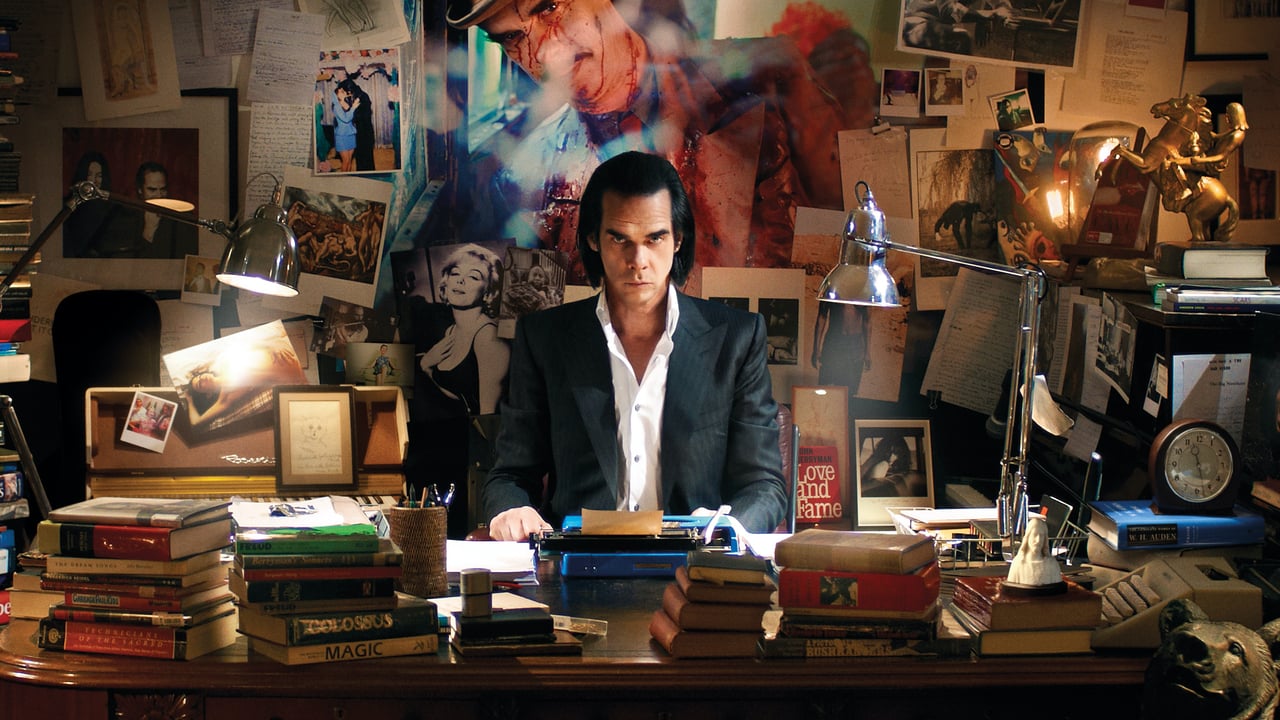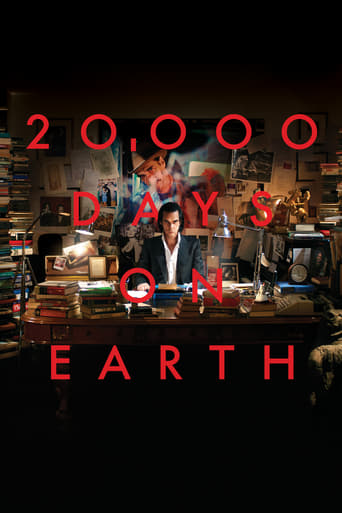

I've been a huge fan of Nick Cave since 1994 when he and The Bad Seeds released their album 'Let Love In'. And over the past twenty years, I have purchased his music on vinyl, CD, and digitally. Nick Cave is not only one of the coolest people on the planet and a legendary musician and singer, but he is also a filmmaker who often collaborates with the amazing Warren Ellis.For those of you who are unfamiliar with Nick Cave, he looks like what Spock would look like if he went goth in the Wild West and had feelings. You might have heard a song of his in a variety of horror films called 'Red Right Hand', which was featured in the hit Wes Craven movie 'Scream'. And I was upset I missed his amazing show from his recent album 'Push The Sky Away' when it came to Dallas, but a friend and fellow writer went to the show, got first row, and shot a a few clips for the site, which you can see HERE (Amazing, right?).But when I realized Drafthouse Films was releasing a documentary about Cave, I thought I had just won the lottery, because it's not every day where we get an in depth look at the man behind the music. But like all of Cave's work, this is not your standard format documentary. It's an acid trip and fantasy ride through a patch in Cave's mysterious life. The Australian rock legend's fan base has multiplied over the years and he still has one of the biggest cult followings ever in the music industry. This new film called '20,000 Days on Earth' is a breath of fresh air in the documentary world, as Nick Cave plays a very real version of himself as his surroundings coax information out of him.The film opens up with a montage of dozens of screens, displaying things from history, which segues into clips of Cave (similar to how Michael Jackson started his last concert tour), and has Cave waking up in his bed next to his wife, narrating that he is an alien and has been on Earth for 19,999 days. He then goes to the window and opens the curtain to reveal a bright never ending light, which is similar to the cover of 'Push The Sky Away'. And it only gets better from there. Instead of having talking head interviews with Cave, his bandmates, and friends and family, we take a journey with cave as he drives his luxury car and is visited by hallucinations, friendly encounters, poems, and even a fictional therapist played by Darian Leader who has Cave talk about his childhood and career.It's quite brilliant really, but you can't expect anything less than brilliant from Nick Cave. The film is constructed in such a way, that you feel like you received all the information you ever wanted to know about Cave himself, but are also treated to one of the most stylish films to come out this year. And don't worry, you'll get a healthy does of Cave playing instruments, singing, and even a few songs from a live performance where he sings his version of Stagger Lee. It was epic. One of the funniest parts was where Cave was writing and playing the piano, coming up with sounds and lyrics that was eerily similar to a famous Lionel Richie tune. It was quite humorous.Whether you are a Nick Cave fan or not, this film delivers the goods on every level both stylistically and story-wise. And it once again proves that Nick Cave is still a creative genius, mad scientist, and one hell of a musician.
... View MoreWith Easter coming up,I started searching round for a music documentary that a friend could watch during the Easter holiday.Searching round on Amazon UK,I was surprised to find a doc on Nick Cave,which led to me picking up a bunch of bad seeds.The plot:Waking up on his 20,000th day alive,musician Nick Cave begins recording a new album with regular collaborator Warren Ellis.Along with recording a new album,Cave begins to talk to friends about why they do particular professions.Whilst making music & talking to friends,Cave begins reflecting on memories,and the meaning of his existence.View on the film:Opening with an atmospheric shot which has Nick Cave's life flash before the viewers eyes,co-writers/(along with Nick Cave)directors Iain Forsyth & Jane Pollard take a fascinating,partly-staged improvisation /partly- real approach to the movie,with Cave being kept driving in a car, (to a destination that is never revealed)whilst talking to friends who disappear like ghosts.Staging scenes of Cave talking to a shrink,Forsyth and Pollard use the fictional moments (such as Cave talking to a fan who is playing his shrink,and 2 archivists pretending to be working on a Nick Cave archive) to superbly emphasis the psychological connection that Cave makes with his audience in the thrilling concert footage.Appearing like a preacher in the concert footage,Nick Cave gives an excellent performance as himself,with Cave giving the movie strong mythical vibes during his car journeys.Cave also gives the movie a hauntingly deep melancholy streak,as Cave attempts to piece together fading memories with the film makers,on his 20,000th birthday party.
... View MoreDocumentary profiles of famous musicians are ubiquitous and they are mostly rather repetitive, but this is a breath of fresh air. This unique and challenging gem goes for a different approach about the much celebrated Australian musician and writer, Nick Cave, who in this film is marking his 20,000th day on Earth. One of the unique things about this documentary is that in many ways, it is not a documentary as some of it is fictional and scripted. It is generally difficult to tell if it is fictional or if it is genuine Nick Cave. I cannot imagine this kind of approach suiting any other musician other than Nick Cave as he is a rather odd character who probably sees a world where fiction and reality blur.On the 20,000th day, we see Nick Cave playing a version of himself going about his day in a nicely shot and artful account of what is routine. He drives around Brighton first going to an interview, then visiting his friend and band mate, Warren Ellis, in his idyllic seaside home for a seafood lunch. He has what seems like imagined conversations with random celebrities who appear in his passenger seat as he drives and he goes to his archive studio where he examines photos and bits of writing he did in the past. Interspersed between these scenes are a mixture of studio performances and live concert footage of Nick Cave performing mainly new material from his last album 'Push the Sky Away' with the Bad Seeds.The documentary starts off with a surreally beautiful timeline of Cave's life filled with quick appearances of personal stock footage and various pop culture since 1955 all edited at a rapid fire pace. As it progresses, we see Nick Cave ponder many things like existence, the creative process, inspiration, memories and other philosophical and poetic musings. This coming out of the mouth of a less experienced musician would sound like a pretentious fart, but since Cave is notorious for his dark eccentricity, it is pretty much expected from him. The interview near the start shows this very well as it is a revelatory and candid conversation as he talks about very personal memories which make him who he is today. Nick Cave does have a darkly poetic perspective, and the imagery supporting his powerful voice make this experiment something of a cinematic experience. One chief example in particular is a spoken word piece which he wrote many years ago. I remember reading it when it was on display at the Nick Cave Exhibition in Perth, Australia and thinking it was a particularly well worded expression of love at first sight which stuck in my head. It is about how he first met his wife and the feelings experienced at that moment completely exceeded any other experience of women through real life and pop culture (Cave worded it far better). It was interesting to see this written text come to life with the rapid edit of stock footage with Cave's voice reading it.The scenes in Cave's car are surreal, especially when notorious British actor, Ray Winston appears in his passenger seat to discuss performing art. Cave discusses his form of expression from a musicians perspective while Ray Winston makes comparisons to his acting experience and complaining about the weather! Also, Kylie Minogue, a one time collaborator with Nick Cave, appears in Cave's rear view mirror much like the character Betsy in the closing scene of 'Taxi Driver'. Her and Cave discuss audience connection.It may be a partially fictional documentary but somehow it seems less self-aggrandizing with this approach as Cave seems to be playing a version of himself where he could only be perceived as weird and interesting, playing up to an image which already exists. In my opinion, I think it helps to appreciate his music in order to enjoy the film as there are extended performances of what is an acquired taste. I generally find his music interesting, but that was not the most interesting thing about it. I felt it was not just a film about Nick Cave, but about existence in this convoluted, manic and complex world and how one fits into and draws inspiration from it. It can be seen as unique and original, albeit a little pretentious in parts, but I have never seen any profile of a musician done this way.Check out my film blog - www.projectionistreview.wordpress.com
... View MoreNick Cave is an interesting character. I had heard of him and his music for a couple of years. It wasn't until recently that I fell in love with his album "Push The Sky Away". This is documentary about Nick Cave so I expected the documentary to be about him. It's a bit shocking to read that he was portrayed as "pretentious". I find that a bit comical actually. This man is a musical genius! Nick Cave is an amazing performer , as I've seen him live a couple of times, so seeing this documentary put the pieces together and gives the audience a sneak peak into his personal life. First of all, the scenery where the documentary was shot is jaw dropping. The live performance in the documentary are pretty amazing . The documentary overall was shot beautifully. I'd describe this documentary as a really good lyrically pleasing song. It's inspiring . ****TINY SPOILER BUT NOT REALLY******My favorite scene was towards the end where he's walking through the dark tree-bush filled garden. What he says brought love to my ears. Nick Cave finds the words you've been thinking and meaning to say, but hard to describe in words. If you don't fully know the artist, I don't really recommend you watching it. I don't really see the purpose, you'd just be lost. This documentary isn't awful or average by far.
... View More